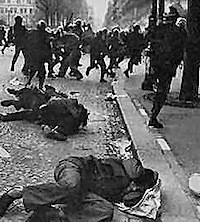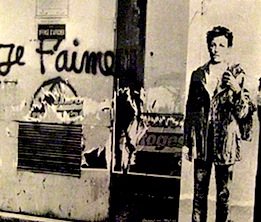Émile Benveniste in conversation with Pierre Daix, 1968
Paris in 1968

Structuralism and linguistics
Jacket 35: Émile Benveniste in conversation with Pierre Daix, 1968, translated by Matt Reeck.
Les événements — the “events”. Students dissatisfied with the policies of the De Gaulle government took to the streets in May 1968 in what are now referred to as the “events.” These protests shook the French government from the laissez faire policies of the previous thirty years. They mark the turning point of an intellectual ferment whose noteworthy members include the vanguard of post-structuralist, Feminist, psychoanalytic, and deconstructive thought — an intellectual renaissance that continues to define our era.
Read the rest of the interview in Jacket 35

Émile Benveniste (1902–76) is among the most important French linguists of the twentieth century. His theory of enunciation — the “énoncé” and “énonciation” — argues persuasively that language is a social process. Also a pre-eminent historical linguist of Indo-European, he was elected to the Collège de France (the most prestigious intellectual post in France) in 1937 where he stayed until his retirement in 1969. You can read his work in Indo-European Language and Society (Faber and Faber, 1963) and in Problems in General Linguistics (University of Miami Press, 1971).
Pierre Daix: You have lived through, over these last thirty or even forty years, not only the transformation of linguistics, but also its rise to a central position in the humanities, a “guiding discipline,” as it were.
I want to ask you how you would characterize this evolution, this transformation, from a linguistic perspective. But, maybe, to begin with, to contextualize things, I would like to ask you a personal question, similar to a question that we earlier asked Jakobson here. How did you get interested in linguistics?
Émile Benveniste: I had the opportunity to begin a scientific career when I was very young and in large part due to the influence of a very great linguist, a man who contributed greatly to training linguists and to defining linguistics during, you could say, the first ten or twenty years of this century — that is to say, my teacher, Antoine Meillet.
It was because I met him while still early on during my studies at the Sorbonne, and because I was clearly much more inclined to research than teaching, that our meeting proved decisive for me. He taught comparative grammar exclusively. But, to be clear, the students of Meillet were in part absorbing the teaching of Ferdinand de Saussure, such as it existed during his time in Paris. This is very important for anyone who writes the biography of French linguistics, even though the Saussure who taught for ten years at the École des Hautes Études wasn’t Saussure as he is universally known today.
He was in some way a comparativist.
He was strictly a comparativist, extremely young and precocious, who had been discovered and adopted by a man who knew what makes a great man, Michel Bréal. We come here to the real beginning of linguistics in France. Bréal saw what Saussure might become, what he already was. He had had a true genius for comparative linguistics and brought new methods to the reconstitution of Indo-European.
That happened when?
That happened in 1878. Saussure joined the École des Hautes Études when he was twenty-four, and he taught there from 1881 to 1891. Then, forced somewhat by circumstances, he returned to Geneva when he was thirty-four, abandoning the beginnings of a brilliant career in Paris, which Bréal would certainly have helped him develop further.
Under the horizon